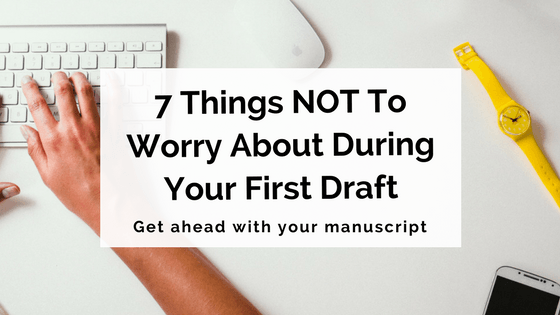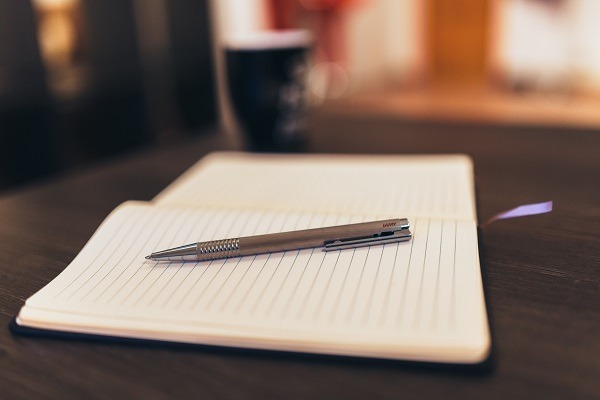Let’s start off with a fact: most (if not all) first drafts are terrible. Even Ernest Hemingway says so.
There’s not really any avoiding this, not even for the most talented or experienced writer. But when you think about it, the concept of a less-than-stellar first draft is actually quite liberating. It means you’re free to write without expecting too much of yourself, without constraint or worry or overthinking.
At least, that’s how it is in theory. But in practice, many writers still suffer from worries and setbacks during their first drafts. It can be hard to completely let go of what’s holding you back and just write, write, write.

If this sounds familiar – if you’re in the midst of a first draft and finding yourself stalling, stressing, or stuck – read on. We’re about to cover seven things you DON’T need to worry about during your first draft.
After all, what are second (and third, and fourth) drafts for?!
1. Writing quality
Here’s the first worry you should banish while working on a first draft: ‘the quality of my writing isn’t up to scratch’.
We don’t say this to convince you that it is up to scratch; we say it because it absolutely isn’t, and that is absolutely OK.
Nobody’s first draft reads like a beautiful bestselling novel. In fact, most writers’ first drafts don’t read very smoothly or elegantly at all. And the sooner you understand and accept this, the sooner you’ll finish that draft.
We understand that many writers are perfectionists (especially if you also happen to be a freelance editor). You might be in the habit of writing and rewriting each sentence as you go, constantly doubling back to read and edit when you’ve just written.
While this kind of perfectionism isn’t necessarily a bad thing, it’s far from ideal when you’re working on a first draft.
Revising and editing as you go makes for an extremely slow process, and can therefore halt the momentum of your storytelling. Obsessing over writing quality can also stilt your creativity – the last thing you need during your first attempt at writing your story!
Word choice, sentence structure, technical details like spelling and punctuation: these can all be set aside and worked on in later edits. For now, just let the words flow however they will so you can get the story on the page.
Just remember that the first draft is as bad as the book is ever going to be.” —Robin Stevens

2. Voice and style
Finding your voice and developing a unique writing style are among the trickiest things you’ll do as an author. For this reason, we recommend that you don’t focus on them during your first draft at all.
Why? Because the only way to truly find your voice and style as a writer is just to write. Write what comes naturally, how it comes naturally.
It won’t be the most polished or perfect thing first time around, but it will give you something to work with later. The essence of your writer’s voice will be there, ready to hone and refine.
First drafts are not the place to be obsessing over the perfection of your writing style. First drafts are for getting lost in the story as you tell it to yourself. Working on the way you tell the story is strictly for the editing phase.
The first draft reveals the art; revision reveals the artist.” —Michael Lee

3. A flawless structure
Structure is one of the most important aspects of a novel – and one of the most difficult things to get right.
If you’re a ‘plotter’ rather than a ‘pantser’, you’ve probably considered your novel’s structure in great depth in your pre-writing planning process. But don’t fall into the trap of trying to perfect your structure before even starting to write.
Despite it being a bit of a cliché, the old ‘can’t see the forest for the trees’ adage is perfect for this situation.
When you’re writing a first draft, you’re so caught up in navigating your way through the story that it can be hard to see the grand scheme of things. And the grand scheme of things is where you need to be before you can properly consider your novel’s structure.
When you’re drafting, write whichever way works best for you. If it’s easiest to simply dash things down in the order they enter your head, do it. Don’t worry about whether your structure makes sense or is effective and engaging.
Don’t worry about little structural things, either, like breaking chapters in the right place. All of this can be fixed later, when you have a completed draft to work with and can see the bigger picture with a fresh perspective.
After all, what else is structural editing for?
I’m writing a first draft and reminding myself that I’m simply shovelling sand into a box so that later I can build castles.” —Shannon Hale

4. Descriptions
We all love reading a novel filled with beautiful descriptions. Whether it’s a vividly painted portrait of a setting, or a detailed description that helps us picture a character, descriptions immerse us in the story and make it that little bit more ‘real’ for readers.
During your first draft, however, it can be all too easy to agonise over descriptions, rather than focusing on getting the story down.
Dawdling over descriptions and taking too much time to perfect them the first time around is a surefire way to slow your momentum when drafting. It can even become a method of procrastination, helping you avoid getting on with some of the more difficult elements of a draft.
Our advice: unless description flows quickly and naturally from your fingers as you’re writing your first draft, leave out the details and come back to them later. In your revisions, you can work on layering intricate details and painting a more vivid picture for readers.
The first draft is a skeleton … just bare bones. The rest of the story comes later with revising.” —Judy Blume

5. Themes
Good novels tend to be rich in their thematic content. After all, one of the most prominent functions of books is to make us think and reflect – about ourselves, our world and the nature of life itself.
When you consider what a book is about, there are two components: its plot and its themes. Plot is what happens in the story; themes are the ideas that arise from this. As Courtney Carpenter at Writer’s Digest suggests:
To put it in its most simple terms, theme is what our story means. How it relates to reality and life in general. What is says about life and the infinite roster of issues, facets, challenges and experiences it presents.”
Now, this is all well and good – until a writer starts worrying about themes during their first draft.
If you’re finding yourself stressing about your themes while you write your first draft, not only will you be held back from letting the story flow, you might also risk forcing themes into your novel. And if there’s anything a reader can spot from a thousand miles away, it’s a theme being shoved in their faces or spoon-fed to them.
Now, we’re not saying you shouldn’t think about themes at all while drafting your novel. Rather, we’re recommending that you have a basic idea of the themes your story might cover, but also realise that many of your themes will be explored unconsciously.
It won’t be until you finish writing and revisit the story that you realise what your themes truly are. Then, you can work on exploring them further during the revision process, fleshing them out with nuance and depth.
First drafts are for learning what your novel or story is about.” —Bernard Malamud

6. Minute details
Picture this. You’re writing away on your first draft, then you pause briefly to consider a small detail. Your character might be utilising a weapon, for example, and you might want to make sure it’s the right type; or you might wonder whether the weather conditions you’ve written are viable for your story’s location.
‘I’ll just check this quickly,’ you think, jumping onto Google… But before you know it, you’ve disappeared down a research rabbit-hole, and all your precious writing momentum is lost.
Sound familiar?
If so, you might not be writing as smoothly, quickly or effectively as you could be. You might be wondering why you’re not making as much progress as you hoped, or why the story isn’t quite flowing as you write.
To combat this, you need to get into the habit of passing over minute details and flagging them to come back to later. Treat them as speed bumps rather than road blocks during your first draft; pass over them and keep your momentum going.
This can be especially difficult for speculative fiction writers. When you’re writing fantasy and sci-fi, world-building is such a huge part of the process, and detail is often extremely important.
But remember: you can always come back and layer detail over your story in later drafts, and you can check everything for logic and consistency during the editing process.
Don’t get it right – get it written.” —James Thurber

7. Following an exact outline
Now, don’t get us wrong – we’re big fans of planning when it comes to novel-writing. If you outline your novel, you’re more likely to be able to push through the first draft quickly and efficiently using that rough sketch to guide you.
However, sticking rigidly to an exact outline can sometimes do more harm than good. You might risk stifling your creativity and restricting your story’s potential.
Remember to leave yourself free for the joy of discovery. If your characters suddenly take you down an unplanned, unfamiliar path, don’t be afraid to go with them. If your story starts taking a different direction than the one you intended, try it out and see what happens.
You can always revert to your original plan later if it doesn’t work. During your first draft, just enjoy the process and allow the story to unravel as naturally as possible.
The first draft is just you telling yourself the story.” —Terry Pratchett

***
Writers, what are your tips for overcoming difficulties with a first draft? Share them with us in the comments below!
27 responses to “7 Things NOT To Worry About During Your First Draft”
Claire,
This post hits on a lot of great advice. I am an author of picture books, with a novel I am marketing, and chapter books in the works. My favorite tool when drafting is the “comment” tool in Word. When I’m writing a passage and I know something will need to be fixed later, I simply put a comment such as “find the right Aztec clothing” in the comment box, and move on with my writing. It gives me the peace of mind to know what needs to be revised while not stopping the flow of the first draft.
Thanks again for the words of wisdom.
Hi, James. I do this too. Once I started leaving ‘Comments,’ my writing sped up quickly.
Claire, thank you so much for all these great tips. I agree with them all.
Hi Megan,
You’re most welcome! Glad to hear the tips were useful for you, and that you’ve also been using the great Word comments trick James mentioned. It definitely takes a lot of the pressure off during that difficult drafting stage!
All the best with your writing 🙂
-Claire
Hi James,
Thanks for your comment! So glad you found the post helpful.
Fantastic idea about using the comment tool in Word. Sounds like it makes your process a whole lot more streamlined (which I’m sure comes in handy, as it sounds like you’re a very busy author!).
All the best with your writing and marketing. 🙂
-Claire
good article Claire, i agree 100% i have been down many research rabbit holes and then I have to snap out of it and get stuck in to it. The best thing I read before I started going gang busters, was to make the first draft a compost. Then rake the shit out later. Any advice or feedback is helpful I think.
PS. I am also from Newy.
Hi Peter,
Great to hear from another Novocastrian! And very pleased to hear you enjoyed the article. It’s so easy to get distracted by research, isn’t it? Definitely agree with the ‘compost’ approach of throwing everything in to start with and refining later!
Best of luck with your writing. 🙂
-Claire
Oh my this was super helpful Claire! I get lost so much in the rabbit hole of research that most days I feel like this draft will never end. I could relate to almost everything you said. I got so frustrated today that I said to myself “You either need a writing mentor or a support group, this requires help” so I thank you for posting this article. Now I can happily give life to my story instead of belly aching over every little detail until edits.
Hi Chantelle,
So glad you found the article helpful! I totally know how you feel (and I can imagine every other writer does too!) when it comes to getting caught up in detail and research during a first draft. It’s nice to plan and be prepared, but there does come a time where the prep and planning need to give way to actual writing – hard as that part may be!
Wishing you all the best with your story 🙂
-Claire
Yep, I’ve done #1 the whole time.
All the way through, I’ve been “I don’t like this”, “I should fix that”, “This is terrible” and the actual writing’s not finished yet.
But I’m most of the way through it…after almost a year and a half.
Congrats on your progress so far, Mark! Totally understand the self-doubt and self-editing impulse, but it sounds like you’re powering through it really well 🙂 Keep going!
-Claire
Just write! Get your ideas down while you have them and deal with the mess later.
Totally agree, Anne! It’s super important not to stand in your own way during the first draft 🙂
This is great! Thank you, I really needed it. I let my best friend read the first 20 pages of my first draft ages and ages ago (not a good idea as I now realise because first drafts are just baaaaad) but I was talking to her tonight about my novel which I’m still working on and saying how I know parts are cringey but I’m enjoying writing it, and she said something about how those pages I showed her ages ago were cringey and not my best writing but she didn’t want to tell me back then. I don’t think she realises I’m still working on that story (just writing a different character pov at the moment) because that comment still crushed me a little. I know it’s not my best, but it’s discouraging to hear it from someone, you know? Anyway thanks for reminding me that first drafts are bad- and that that’s ok and in fact to be expected. When I edit it and rewrite it I’ll shape it into what it’s meant to be, but for now I just need to keep on writing and enjoy myself!
Hi Mareth,
You definitely have the right idea – absolutely keep writing and enjoying yourself, and focus on rewriting, polishing and improving later! Totally understandable that you felt upset by your friend’s comments, but as you said yourself, it’s important to remember that it was the first draft they saw, not the finished product. Show them again once you’ve finished editing and rewriting and you’ll get a different response for sure!
Best of luck with your novel. 🙂
Thank you so much for this excellent post! The web is clogged with writing advice that honestly feels far from encouraging, but this post was just what I needed to read right now. I have indeed fretted over all of the above, and it has absolutely stifled my creative process. Trying to get it right from the get-go has made the entire process excruciating, and I’ve even considered quitting altogether. But I think I finally get it now… Just tell myself the story! Cracking on.
Hi Kajsa,
You’re very welcome, and I’m glad to hear the post was helpful to you! It can be so hard to let go of all those worries and, as you said, just tell yourself the story, but once you figure out how to, you’ll be on a roll for sure. 🙂
Best of luck with your writing!
Claire
I’ve just started writing my first fiction and the first draft has all of the issues you recommend to ignore. I’m getting along much faster now that I’ve read your post (even though its not readable!)
Since I am a novice at this, I was surprised at how once I stopped worrying about the book and focused on the story, the characters and their story became more real to me.
Thank you for the insight!
Hi Ruchi,
You’re welcome! So glad to hear the post has been helpful for you, and that the writing process has become a little smoother now you’ve been able to stop worrying. Best of luck with the rest of your draft. 🙂
Oh my gosh! I am so glad I found this article! Actually, I found it during a google “rabbit hole” I went down doing some quick research! I have 3 unfinished manuscripts and one that I started over a decade ago. I think in all cases I stopped because it was too stop and go and I eventually gave up as the process was so doggone slow! Reading my first one that I started when I was 22, I found it super cringe and just straight up yuck. LOL
Now. throughout the whole writing process, I find myself experiencing self doubt (“who am i even to write this?”) questioning my ability to write and my literary knowledge as I have my GED and never went to college. The knowledge I have comes from lots and lots and LOTS of reading I’ve done over the course of the years and an insane imagination. That’s pretty much it.
Thank you so much for your article! I feel so much better!
Good luck to everyone! We can do this!
So pleased to hear the article was helpful for you, Issy! Self doubt and impostor syndrome are common to pretty much every writer at some stage, and it can be really hard to keep going when you feel like you’re dragging your feet. But like you said, you have plenty of knowledge and experience with stories, so have confidence in yourself and keep plugging away at those drafts!
Best of luck 🙂
I’ve read this post about twenty times by now. Since I am struggling with some busy schedule as of now, I’ve halted the planning phase. When I get back to it, I will be sure to take my time (which does not mean procrastinating!) and then I’ll move on head first into writing the dang thing. All I know is that a character appeared to me in a dream and I will not lay it to waste! But alas, now is not the time to write fiction. Not yet. Soon, very soon, though…
Cheers from a brazillian reader!
Sounds good Igor! No need to rush your planning.
Using dreams as inspiration for your writing is a seldom-used technique, but one which some writers use to great effect. If you have these types of dreams often you should keep a notepad next to your bed and keep a basic dream log every morning, and refer back to it from time to time. Over an extended period of time you could build up a fantastic collection of unusual ideas which you can use in your stories =)
Enjoy!
Dave.
Thank you angel! Write on time! Thank you so much the universe!
Strange how this landed in my e-mail a day after I read some of my SECOND draft and thought ‘God this awful, how the hell am I going to write this properly?’ It was a sucker punch! And then I got this e-mail and I’m very thankful for it! Very thankful!!!
And thanks for mentioning rabbit holes…..hhmmm let me just Google how a light switch actually works…UH OH!!!! Ten hours later……….
Many many thanks again,
Richard
Glad to have been of such a huge help, Richard!
Very interesting article. I’m writing a spec fiction ms and I agree with the distraction of world building. I saw some comments about the comments feature in Word. Now I do XXX beside anywhere that needs obvious research or improvement.
I also tell myself “it’s okay, the editor (me) will fix this” when I cringe while getting the stuff down.
A comment I read a year or so ago was to get the content out of your head to make way for new ideas. Very true. I ruminate on ideas that haven’t hit paper so this has worked very well for me, remembering this.
All the best and thanks for the read x
Angela
Thanks so much for the quick editing tip Angela – we really appreciate your input on this!
Cheers
Dave.